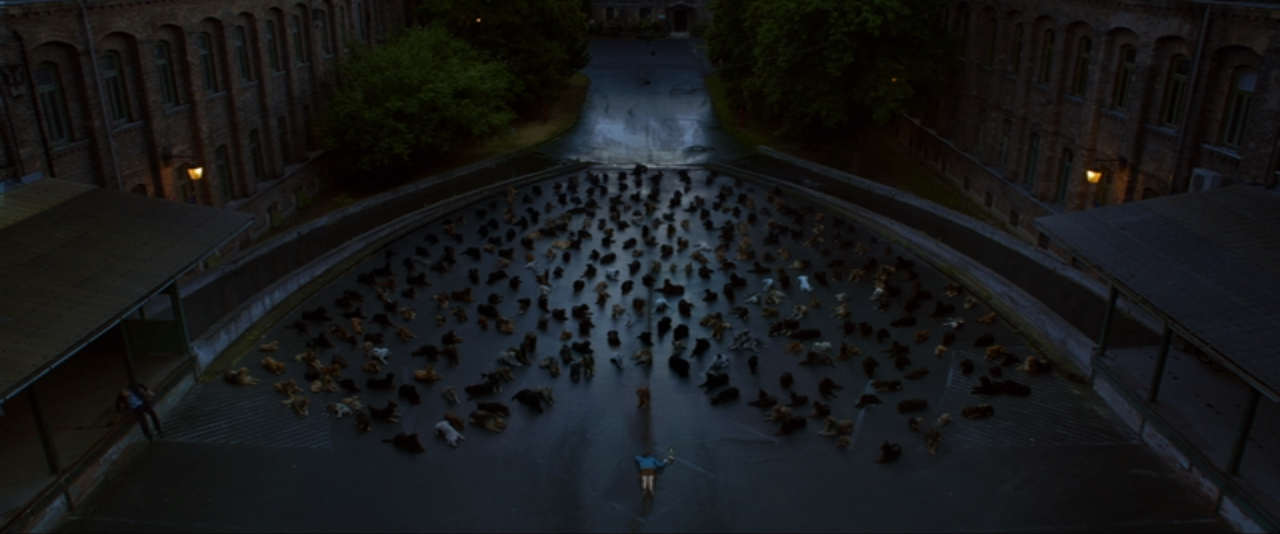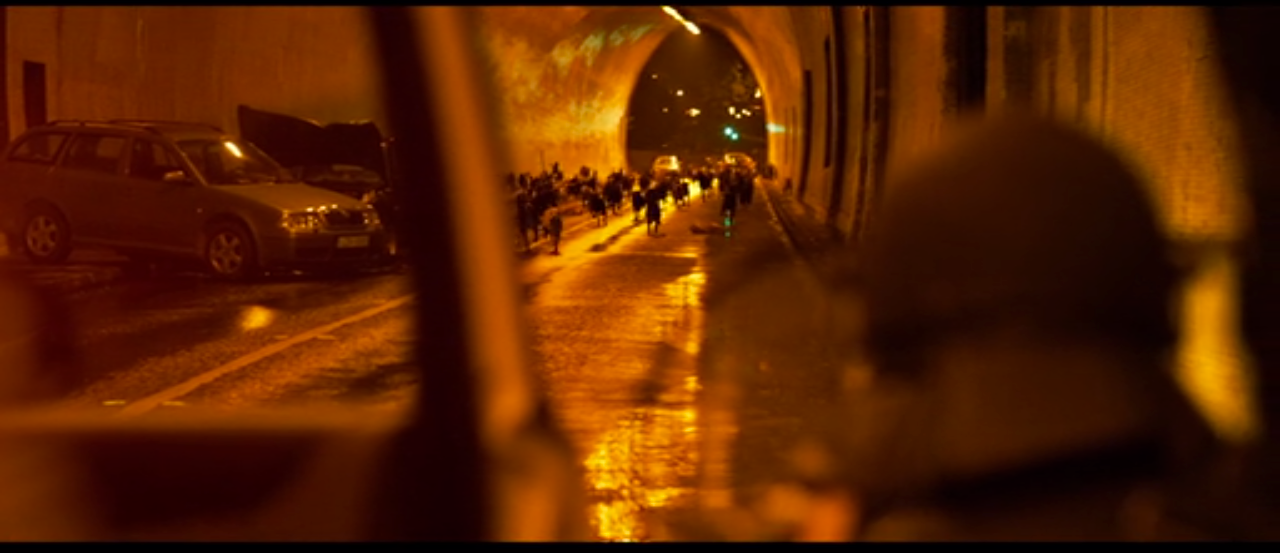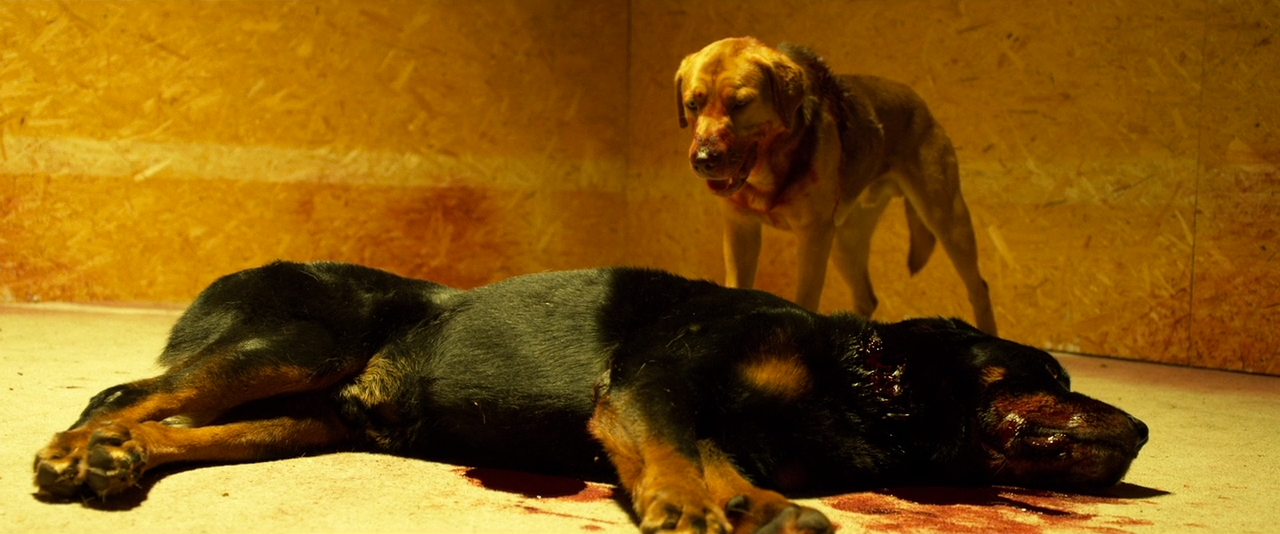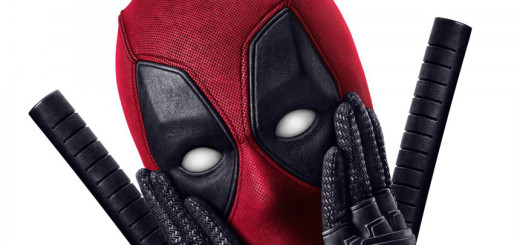WHITE GOD Review
Director: Kornél Mundruczó
Genre: Drama
Release: 2014
The prologue to WHITE GOD plays out like a Spielbergian dream, oddly reminiscent of the climax of E.T.: our be-hoodied protagonist rides her bicycle through the abandoned streets of Budapest, only to be suddenly chased by a vast swarm of dogs running as an organized army. There is a strange, deeply unsettling conflict of innocent girl versus pack of wild beasts established, as we suddenly cut back several weeks in time to the actual beginning of the narrative. Chronologically, WHITE GOD begins with Lili, a thirteen-year-old musical prodigy, being dropped off by her mother to live with her estranged father, while Lili’s mother attends an academic conference. Lili brings along her mixed breed dog, a dog whom her father instantly dislikes and whom Hungarian society apparently immediately refuses to accept without proper registration and taxation. Eventually, the dog, Hagen, is abandoned by Lili’s father on the side of a road and left to fend for himself. Hagen is swallowed up by a cruel world of dogfighting and impoundment, eventually leading an uprising of dogs against the people who oppress them. It’s a film that was well received at Cannes and a number of other respected festivals, but it most likely will be met with only the most tepid response from audiences now that it is available to the general public via Netflix, and rightfully so.
The Baja Men jokes write themselves
On a technical level, there are several moments in WHITE GOD that are spellbinding due to the intimate characterization of the dogs who perform for large chunks of the film. Particularly, the scenes in which the swarms of hundreds dogs overtake Budapest are captivating due to their sheer scale. There is something undeniably fascinating and terrifying about watching an army of dogs take over a European city, but without a clear investment in the motivations The thing WHITE GOD suffers from as it laboriously brings us back to the moment the film began is the same thing so many films that deal with a fantastical premise suffer from, it sets up a world it doesn’t fully explore or consistently understand and as a result is mostly confusing and unsatisfying.
A Congress of dogs, probably more cooperative than the one on Capitol Hill
In a lot of ways, the film shares striking similarities with the recent reboots of the PLANET OF THE APES franchise as it relates to animals that possess a complex but ultimately abusive relationship with humans and take action against them. WHITE GOD falters when it doesn’t quite manage to set up the nuanced and conflicted motivations of Hagen in the same way that the PLANET OF THE APES films set up the motivations of Cesar. Hagen is abused by a series of shady characters after he is abandoned, and when he is empowered to take action with an army behind him, he attacks those characters directly. In PLANET OF THE APES, in comparison, Cesar faces the worst of humanity and takes revenge against humanity in a more general manner, despite the moments of regret that he experiences. Cesar is a being who is different from humanity and attacks our species accordingly, Hagen is a Quentin Tarantino character enacting vengeance against the specific people who have wronged him, making for an unsatisfying parable considering that he is not a person in and of himself.
An obligatory police vs. dog standoff
WHITE GOD seemingly wants to be a lofty art film, but can never comfortably sets an identity for itself. Is it a lucid, dreamlike, postmodern fantasy tale? Is it a social realist film with a strong message that takes a sudden turn into the bizarre? Or is it a Hollywood disaster movie in a different language? From scene to scene, the viewer could believe it is attempting to fit into any of these genres, although not particularly adeptly. Perhaps what is most disappointing about WHITE GOD is that it takes an hour and a half to actually get to the crazed uprising of the dogs. Once it does, there is little satisfaction, because the film cannot deliver on any part of the promise of this premise. The violence of the dogs attacking the humans is never truly disturbing; any time the dogs go for the throat, the film cuts away. In addition, the logic of how the dogs tear through the city never particularly makes sense; their goals do not seem to be to take over the city, but rather to attack the specific people who mistreated Hagen. Consequently, there is no social statement about how people treat animals, no focused presentation of a bizarre and absurd scenario, and not even an entertaining satisfaction in watching dogs maul people. There is nothing to draw any particular audience in to this film.
The media only covered it because they weren’t of the same breed
At the end of the day, the sin I personally cannot forgive this film for is its reliance on utilizing dogs as a sympathetic narrative device to an unparalleled degree. There are so many scenes of dogs being abused, mistreated, and killed that exist purely to win over the viewers’ sympathy on a basic level, so that they are willing to accept anything the film does as morally just. There are times the film feels like a sickening intersection of OLD YELLER, HOMEWARD BOUND, and CUJO, taking cute domestic animals, anthropomorphizing them, and then making them scary. Manipulating emotions in such a base and obvious way is simply rudimentary and lazy filmmaking. Don’t believe the hype, WHITE GOD is not a film worth your time and energy.
Verdict: Do Not Recommend

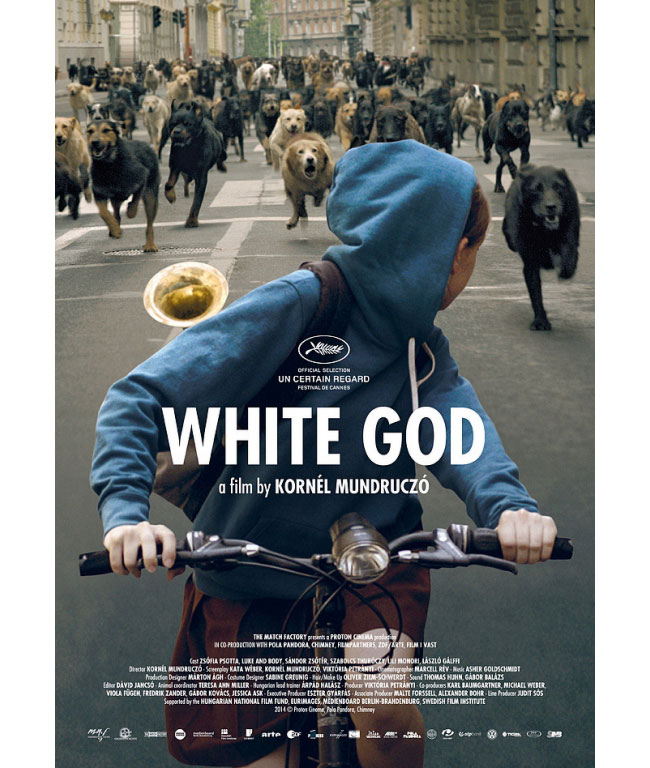
![the white god White God (2014) THE WHITE GOD Dir: Kornel Mundruczo Ref: WHI136AD Photo Credit: [ Proton Cinema / Pola Pandora Filmproduktions / Filmpartners / The Kobal Collection ] Editorial use only related to cinema, television and personalities. Not for cover use, advertising or fictional works without specific prior agreement](https://www.xfdrmag.net/wp-content/uploads/2015/09/white-god-dogs-running.jpg)
